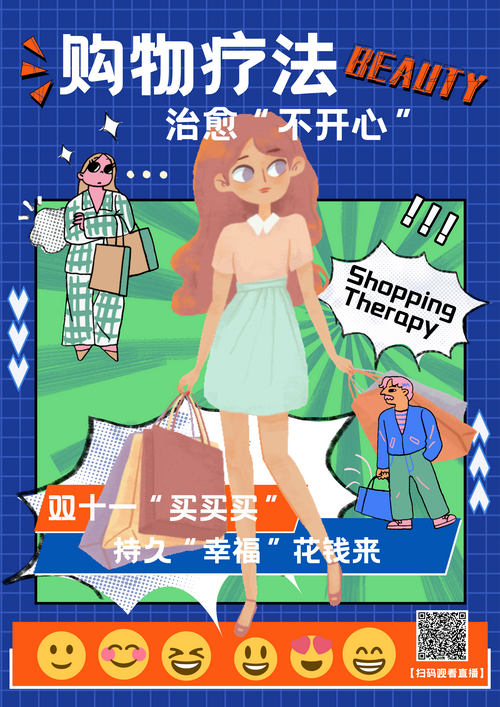22.11.9гҖҗең°йҒ“зҫҺиҜӯ257гҖ‘иҙӯзү©з–—жі•пјҡд№°д№°д№°жІ»ж„ҲдёҚејҖеҝғRetail therapy
time:2022-11-09 Source:
11жңҲ9ж—Ҙжңүи¶Јзҡ„е…Қиҙ№иӢұиҜӯиҜҫгҖҠиӢұиҜӯPKеҸ°гҖӢдә¬жҷ¶дё»жҢҒ
иҠӮзӣ®зӣҙж’ӯпјҡ14пјҡ00-15пјҡ00 еҪ“жҷҡйҮҚж’ӯпјҡ21пјҡ00-22пјҡ00 ж¬Ўж—Ҙ6:00-7:00
д»Ҡж—Ҙеҳүе®ҫпјҡ #и·ҹиҖҒзҫҺеӯҰең°йҒ“зҫҺиҜӯ#
д»Ҡж—Ҙдё»йўҳпјҡReal Life EnglishгҖҗең°йҒ“зҫҺиҜӯ257гҖ‘иҙӯзү©з–—жі•пјҡд№°д№°д№°жІ»ж„ҲдёҚејҖеҝғRetail therapy

дәҶи§Јд»Ҡж—ҘиҜҫе Ӯпјҡ
Dialogue : (иҜҫе Ӯе…Ёж–Үжң¬дәҺеҫ®дҝЎе…¬дј—еҸ·гҖҗиӢұиҜӯPKеҸ°гҖ‘иҜҫеҗҺеҸ‘йҖҒпјҢеҸӮдёҺзӣҙж’ӯдә’еҠЁдёӯиҜ‘иӢұз»ғд№ йңҖеҠ дә¬жҷ¶еҫ®дҝЎgoingforgold2018 жӢүе…ҘзҫӨ
retail therapy
dialogue 1
Jingjing:гҖҖMark, have you got anything ________________________?
Mark:гҖҖI have to ___________________ this week, like any other, even though____________.гҖҖWhat about you?
Jingjing:гҖҖYou know, it's a good time to_______________.гҖҖI'll consider some additions for my winter wardrobe.гҖҖBut I don't need much _______________.
Mark:гҖҖSame here.гҖҖSocks and Legos are the only thing___________________.
Jingjing:гҖҖYour wife told me about ________, and how she needs to _____________________.
Mark:гҖҖOh, OK.гҖҖDo you ever go to_________________?
Jingjing:гҖҖOf course!гҖҖMy dance studio is in a shopping mall.гҖҖAnd my gym is very near a different one.гҖҖIt's so hard to ___________ that I doubt _____________ anytime soon.
Mark:гҖҖYeah, and _______________ are getting filled up with restaurants and _______.
Jingjing:гҖҖWhich is another reason______________________вҖ”even on the way to the subway!
Mark:гҖҖI know, right.гҖҖDo you go shopping ____________?
Jingjing:гҖҖI used to, especially back when I was___________ and made a daily run ________.
Mark:гҖҖLots of people do that.гҖҖWhen you've spent 28 yuan _____________, then 128 for a shirt sounds like____________.
Jingjing:гҖҖDon't I know it.гҖҖAnd then______________ or more and have to think about how to ___________ for the rest of the week.
Mark:гҖҖDo you think a lot of people______________ as a result of their ____________?
Jingjing:гҖҖI just read something about that.гҖҖIt seems to be ____________.
Mark:гҖҖHow so?гҖҖ_________________________.
Jingjing:гҖҖWell, according to the article I saw, 68 percent of millennials said _____________, while only 53% of Gen-X'ers and 26 percent of Baby Boomers ______________.
Mark:гҖҖThat__________ for Baby Boomers.гҖҖTheir parents _________________.гҖҖAs a Gen-X'er myself, I'd say those people who talked to researchers might only have been talking about things they did recently.
Jingjing:гҖҖWhen you________________ as a young adult, you'd buy lots of stuff to _____________?
Mark:гҖҖSure.гҖҖAnd I knew_______________________.
Jingjing:гҖҖEveryone should_________ when they're young, I guess.гҖҖI just hope it doesn't _________________.
Mark:гҖҖ______________________.гҖҖTell me more about the article when I come back.
dialogue 2
Jingjing:гҖҖMark, now that you have your______________, are you ready to hear about how many people have _____________________?
Mark:гҖҖYou don't want to wait for my coffee to cool______________________?гҖҖOK then, how many?
Jingjing:гҖҖ_________ percent of respondents to the survey_______________ I read.
Mark:гҖҖThat sounds like what I've been hearing in the news.гҖҖIt might ____________вҖ”say, if someone _________________________________.
Jingjing:гҖҖI wouldn't know.гҖҖThose respondents only said they ____________________________.
Mark:гҖҖThen again, I heard that a huge number of people ____________________.
Jingjing:гҖҖWhat now?
Mark:гҖҖRevolving their debt: they_________________ from one credit card to pay off another one.гҖҖWith three banks, one person can manage their debt that way, as long as they _______________________.
Jingjing:гҖҖ__________________.гҖҖBut yeah, if someone just graduated and started working in the city, it might be what they have to do for a year or two until they__________________.
Mark:гҖҖThat's what too many people tell themselves: _______________вҖ”when I get promoted or something, this debt _______________.
Jingjing:гҖҖDon't tell me you're one of t___________________ that thinks any debt you can't ________ shouldn't be borrowed.
Mark:гҖҖOK, I won't tell you that.гҖҖBack to ________, though.гҖҖIt sounds like it ______________, rather than __________.
Jingjing:гҖҖIf people get themselves into __________, it can be.гҖҖBut there's plenty of evidence that___________.
Mark:гҖҖI definitely feel __________________.
Jingjing:гҖҖDoes it____________ whether or not___________?
Mark:гҖҖIt definitely does.гҖҖI __________________where everything was too expensive or __________.
Jingjing:гҖҖSame here.гҖҖThat article said that shopping ____________________, many times over.гҖҖPeople had _____________.гҖҖThey were three times less likely to feel sad after buying something.
Mark:гҖҖThat sounds about right.гҖҖHopefully ______________.
Jingjing:гҖҖ82% of people reported____________ about what they had bought.гҖҖSo, it looks like shopping can _______________.
Mark:гҖҖWell, I'm glad shopping malls are _________, ___________.
Jingjing:гҖҖRight, we can always go there to have coffee or milk tea at least, _______________________.
Mark:гҖҖHa ha.гҖҖThat's twenty-first century________________!
new words and phrases
in that department:гҖҖ
keep <someone> on a tight leash:гҖҖ
<be> out <a certain amount of money>:
impulse purchase:гҖҖ
stress spending:
<be> on the same page <with someone>:гҖҖ
max out a credit card:гҖҖ
revolving debt:
a debt cycle:гҖҖ
retail therapy:гҖҖ
